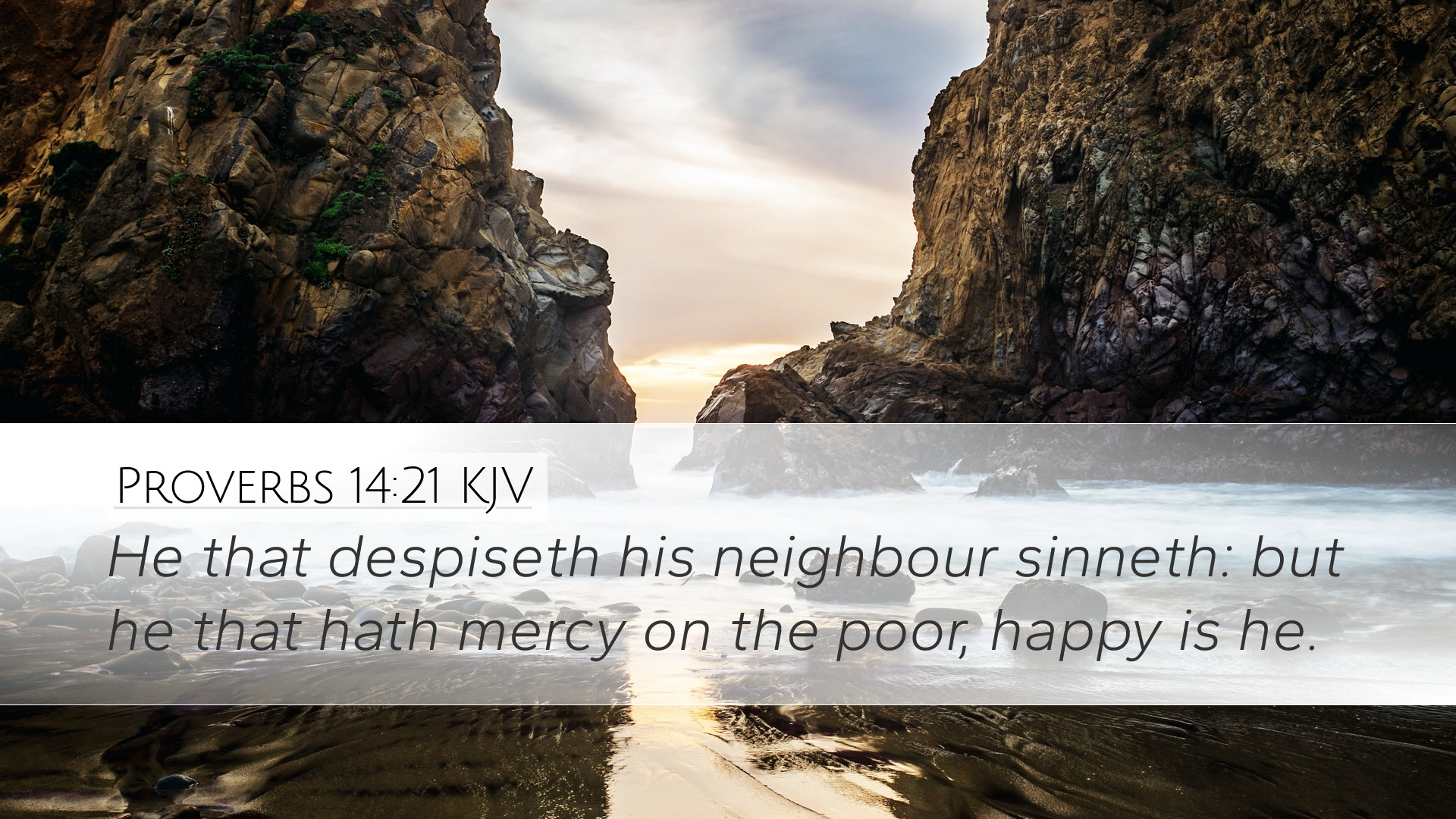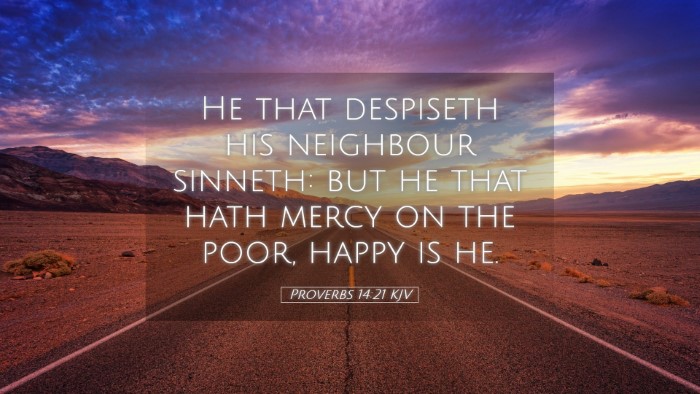Commentary on Proverbs 14:21
Verse: "He who despises his neighbor sins, but he who has mercy on the poor, happy is he." (Proverbs 14:21)
Introduction
The book of Proverbs serves as a collection of wise sayings and teachings that impart moral lessons and practical guidance for daily living. Proverbs 14:21 presents two contrasting attitudes towards one's neighbor and the implications of these attitudes. This commentary draws insights from influential public domain sources, including Matthew Henry, Albert Barnes, and Adam Clarke, to unpack the theological, moral, and practical dimensions of this verse.
The Sin of Despising One's Neighbor
Despising Neighbors: The phrase "He who despises his neighbor sins" highlights a critical ethical principle that governs interpersonal relationships. Matthew Henry notes that to despise means to look down on someone with contempt, showcasing a lack of love, respect, and empathy. This attitude is fundamentally opposed to the commandments that call for love towards one’s neighbor as oneself.
- Meaning of "Neighbor": In this context, the term "neighbor" extends beyond geographical proximity; it signifies any person with whom one comes into contact. This wide definition underscores the universal call to treat all individuals with dignity.
- Social and Spiritual Consequences: Albert Barnes emphasizes that despising one’s neighbor not only disturbs social harmony but also incurs spiritual consequences. Such disdain is a form of sin that can lead to deeper relational and societal discord.
- Examples from Scripture: The Bible is replete with examples of individuals who failed to love their neighbors, leading to dire consequences. The parable of the Good Samaritan (Luke 10:25-37) serves as a counter-example, illustrating the virtue of showing compassion regardless of social boundaries.
The Blessing of Mercy
Having Mercy on the Poor: The second part of the verse states, "he who has mercy on the poor, happy is he." This statement highlights the virtue of mercy as an integral aspect of godliness. Adam Clarke explains that mercy denotes a compassionate attitude towards those in need and that such mercy is not merely an emotional response but translates into tangible acts of kindness.
- Definition of Mercy: The Hebrew concept of mercy encompasses love, kindness, and compassion. It implies an active commitment to alleviate suffering and meet the needs of the less fortunate.
- Joy in Generosity: The phrase "happy is he" suggests that there is immense joy associated with showing mercy. This happiness is often amplified in community settings where acts of mercy foster an atmosphere of support and unity.
- Call to Action: Barnes argues that this verse challenges believers to assess their attitudes towards the less fortunate. The pursuit of happiness is tied to our willingness to show mercy and act justly towards others.
Theological Implications
This proverb raises essential theological questions concerning the nature of sin and virtue. From a Christian perspective, the act of despising one’s neighbor contradicts the core tenet of love that is central to Christ's teachings.
- Love as Fulfillment of the Law: Jesus emphasized that loving one’s neighbor is akin to fulfilling the law (Matthew 22:39). Consequently, to despise a neighbor is not merely a social error but a spiritual failing that disrupts one’s relationship with God.
- The Example of Christ: The mercy extended to the poor and marginalized throughout Christ's ministry illustrates the godly character that believers are called to emulate. Clarke notes that Christ’s life exemplified profound mercy, urging His followers to replicate such compassion.
Moral Applications
Proverbs 14:21 compels readers to reflect on their moral responsibilities towards others, particularly those who are vulnerable and in need. The dual implications of the verse create a challenge to engage in self-examination and faithful discipleship.
- Interpersonal Relationships: Practicing mercy requires a posture of humility and openness. Leaders and congregants alike can cultivate environments of understanding rather than strife, promoting community wellness.
- Social Justice: This proverb invites discussions regarding contemporary issues of poverty and injustice. A commitment to righteousness entails advocating for the marginalized and addressing systemic inequalities.
- Spiritual Fulfillment: Engaging in acts of mercy is not just about fulfilling an obligation; it enriches one’s spiritual life and deepens one’s relationship with God. The joy of being merciful aligns closely with the joy of knowing God’s grace.
Conclusion
Proverbs 14:21 serves as a profound reminder of the importance of our attitudes towards others, especially in a world that often fosters division and contempt. The call to merciful living is not only an ethical imperative but also a pathway to genuine happiness and fulfillment. As pastors, theologians, and students of the Word, let us embrace the wisdom found in this verse, allowing it to transform our hearts and our communities.


